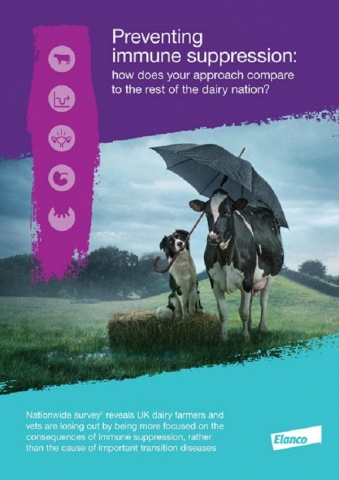
Vets are being urged to focus on the cause of transition disease
Dairy Vets Should Focus On The Cause Of Transition Disease Rather Than Fixing Broken Cows
Dairy vets and farmers focus more on the consequences of immune suppression around calving rather than addressing this leading cause of problematic transition diseases, nationwide survey results have found
A series of surveys commissioned by Elanco Animal Health have found that 98% of UK dairy vets and 72% of producers rank mastitis as the leading herd health concern for dairy producers. Almost all vets and three quarters of farmers correctly identified immune suppression a core cause of the disease.
Despite this, addressing immune suppression is not high on the list of priorities, with the majority of vets rarely discussing the topic with their clients. What’s more, immune suppression barely makes the top 10 list of farmers’ most important herd health concerns.
Around calving, all cows undergo a dip in immunity, with the function of neutrophils reducing by up to 40%1, leaving herds vulnerable to transition diseases such as mastitis, metritis and retained placenta2,3.
While 94% of vets recognise that successfully managing the period around calving is vital for herd health, the survey results reveal that that they do not always associate key transition diseases with the correct cause.
For example, while mastitis is directly related to immune suppression, ketosis, displaced abomasum and ovarian dysfunction are not. However, the latter problems were consistently cited among survey respondents as leading consequences of compromised immunity.
Alistair Macrae, vet and lecturer at the University of Edinburgh, thinks that a shift in approach is needed:
“Most vets and dairy producers are aware that cows are more vulnerable around calving but don’t focus on why this is the case. There is a real opportunity for vets to get clued up on the true impact of immune suppression at calving to help their clients recognise and address the problem as a key cause of their most problematic dairy healthcare issues.
“At the moment, we spend far too much time fixing ‘broken cows’ rather than focusing on the cause of the problems.”
The discrepancy between awareness of consequences of immune suppression and cause may go some way to explain why over 60% of vets do not regularly address the topic with their clients. This is despite the majority of producers looking to their vet as their most trusted source of information on the topic.
"An important take-away from these survey results is that vets need to start discussing the topic of immune suppression around calving with their clients more routinely,” said Francis Cosgrave, Technical Vet (& Dairy Farmer) at Elanco
“Having that conversation is the first step towards culturing a more proactive approach to transition cow management which has the potential to reduce treatment costs and disruption considerably. Farmers will see more time with the transition group as more cost but some simple improvements here will help to decrease costly diseases post-calving, while supporting the cows’ potential for future production”
To read the full survey findings and to find out more about helping your clients monitor stressors that may lead to immune suppression, visit www.vital90days.co.uk
More from Elanco
- ACT Against Lungworm for National Dog Day on 26th August!
- New Elanco survey data for national pet month
- New research reveals over a third of dogs with Angiostrongylus vasorum could be symptomless
- Chance to win with Elanco
- Elanco completes parasiticide portfolio expansion with launch of new CredelioTM Plus, offering vets a parasite treatment for every lifestyle

 8 years ago
8 years ago  1186 views
1186 views

 1 week ago
1 week ago